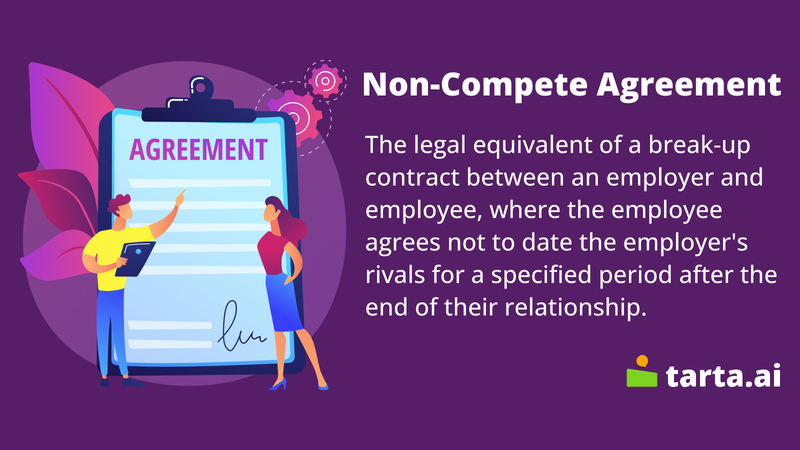Non-Compete Agreements: A Comprehensive Overview for Employees and Employers
Non-compete agreements, also known as restrictive covenants or non-compete clauses, are contracts that prohibit employees from competing with their employer for a certain period of time after leaving their job. These agreements are common in industries where employees have access to confidential information or trade secrets, such as technology, finance, and healthcare. In this article, we will provide a comprehensive overview of non-compete agreements for both employees and employers.

How Non-Compete Agreements Work
Non-compete agreements typically contain a set of restrictions and conditions that limit an employee's ability to work for a competitor or start a competing business. These restrictions may include geographic limitations, restrictions on the type of work that the employee can perform, and the duration of the agreement. In exchange for signing the agreement, the employer may offer the employee additional compensation or benefits, such as a signing bonus or stock options.
For a non-compete agreement to be enforceable, it must be reasonable in scope and duration, and it must protect a legitimate business interest of the employer. This means that the restrictions in the agreement cannot be too broad or unreasonable, and they must be necessary to protect the employer's confidential information or trade secrets.
Interesting fact:
The use of non-compete agreements has increased in recent years, with one study estimating that around 30 million workers in the United States are currently bound by a non-compete agreement.
Non-Compete Agreements for Employees
If you are an employee who has been asked to sign a non-compete agreement, it is important to understand the potential benefits and drawbacks of signing such an agreement. On the one hand, signing a non-compete agreement can offer job security and may increase your bargaining power when negotiating your compensation package. On the other hand, a non-compete agreement can limit your career options and may make it difficult for you to find new employment after leaving your current job.
If you are considering signing a non-compete agreement, you should carefully review the terms and conditions of the agreement and seek legal advice if necessary. You should also consider negotiating the terms of the agreement to ensure that they are reasonable and fair.

Photo: Scott Graham/Unsplash
Non-Compete Agreements for Employers
For employers, non-compete agreements can be an effective way to protect their confidential information and trade secrets. These agreements can also help to prevent employees from leaving the company and taking valuable clients or customers with them. However, employers should be aware that non-compete agreements are subject to legal scrutiny, and if the terms of the agreement are too restrictive or unreasonable, it may be unenforceable.
To ensure that a non-compete agreement is enforceable, employers should work with legal counsel to draft an agreement that is tailored to their specific business needs. Employers should also ensure that employees receive adequate consideration in exchange for signing the agreement, such as additional compensation or benefits.
Interesting fact:
Non-compete agreements are not legal in every state. California, for example, has a law that prohibits most non-compete agreements.
Non-Compete Agreements and the Law
The legality of non-compete agreements varies from state to state. Some states have strict regulations that limit the use of non-compete agreements, while others have more permissive laws that allow for broad restrictions on employee mobility. Employers should be aware of the legal landscape in their state and work with legal counsel to ensure that their non-compete agreements comply with state law.
News:
The Federal Trade Commission (FTC) has proposed a rule that would prevent employers from blocking their employees’ ability to work for a rival, a practice that could raise wages and increase competition among businesses. The FTC’s proposal targets noncompete agreements, which are provisions in labor contracts that restrict employees from joining a competitor or starting their own competing business for a certain period after they leave their job. Studies have found that noncompete clauses can depress pay and stifle productivity, while also reducing competition within industries. The proposed rule is open for public comment for 60 days, after which it is expected to take effect. (The New York Times)

Photo: Gabrielle Henderson/Unsplash
Non-compete agreements can have a significant impact on both employees and employers. Employees should carefully review the terms of a non-compete agreement before signing, and employers should work with legal counsel to draft an agreement that is reasonable and enforceable. By understanding the basics of non-compete agreements and the legal landscape surrounding them, both employees and employers can protect their interests and avoid legal disputes.
- Non-compete agreements are contracts that prohibit employees from competing with their employer for a certain period of time after leaving their job.
- To be enforceable, non-compete agreements must be reasonable in scope and duration, and they must protect a legitimate business interest of the employer.
- Employees should carefully review the terms and conditions of a non-compete agreement before signing, and they should seek legal advice if necessary.
- Employers should work with legal counsel to draft an agreement that is tailored to their specific business needs and that complies with state law.
- Non-compete agreements are subject to legal scrutiny and may be unenforceable if the terms are too restrictive or unreasonable.
- The legal landscape surrounding non-compete agreements varies from state to state, and employers should be aware of the laws in their state.
- Both employees and employers can benefit from understanding the basics of non-compete agreements and the legal issues surrounding them.
FAQ
What types of employees are typically required to sign non-compete agreements?
Non-compete agreements are commonly used in industries such as technology, finance, healthcare, and sales, where employees may have access to sensitive information or trade secrets.
Can an employee negotiate the terms of a non-compete agreement?
An employee can try to negotiate the terms of a non-compete agreement, particularly if the terms are overly restrictive or could limit their ability to find new employment.
What happens if an employee violates a non-compete agreement?
If an employee violates a non-compete agreement, the employer may be able to seek legal remedies, such as an injunction or damages.
Can an employer require an employee to sign a non-compete agreement after they have started working?
An employer can require an employee to sign a non-compete agreement as a condition of continued employment, but the employee may be able to negotiate the terms of the agreement or refuse to sign it and risk termination.